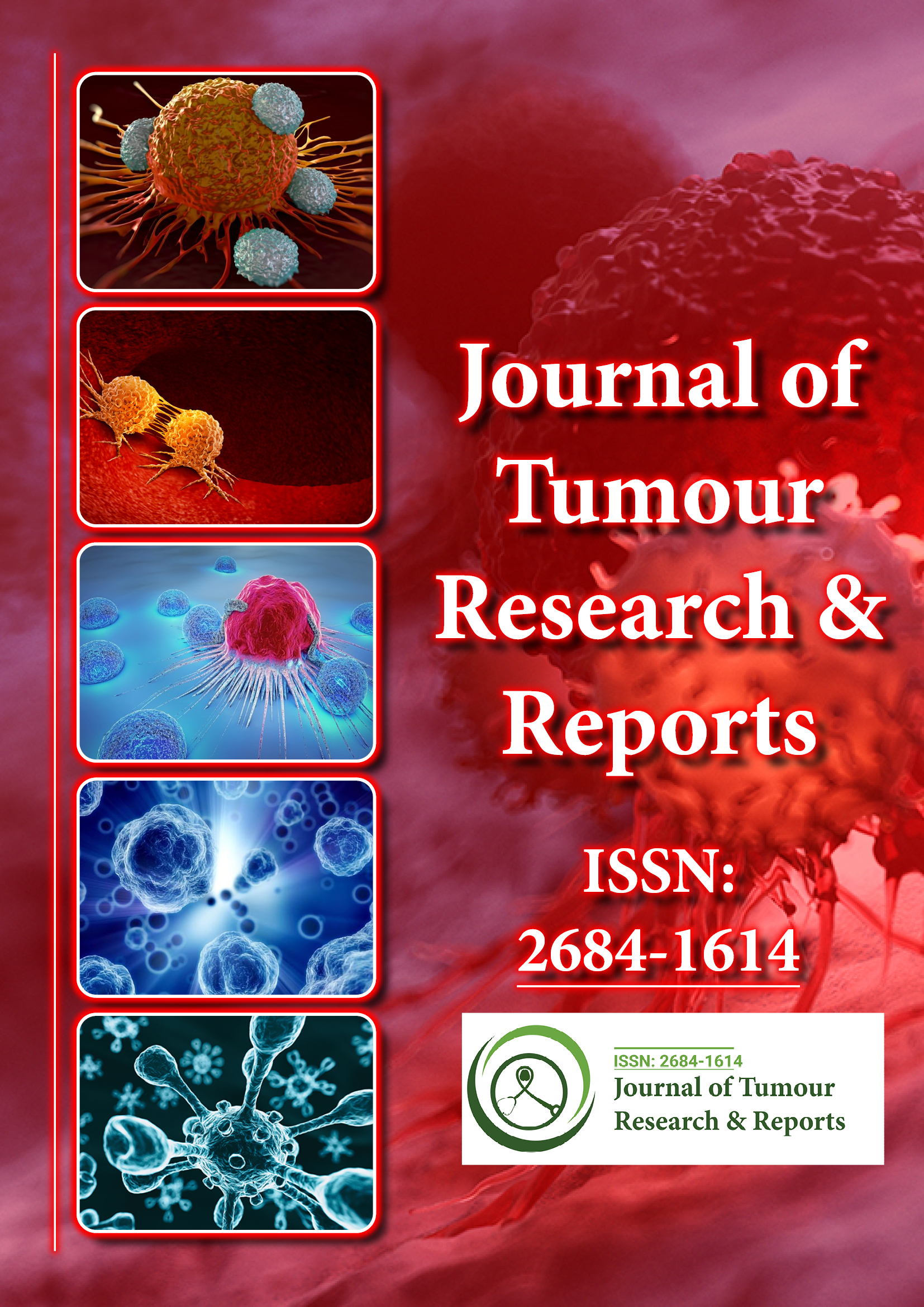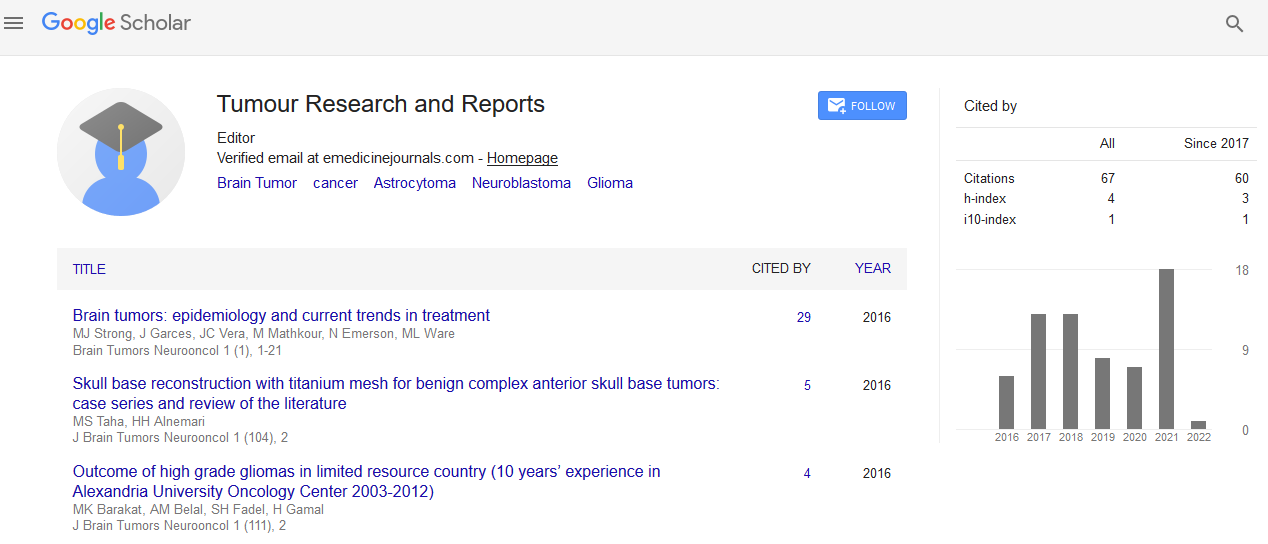Indexed In
- RefSeek
- Hamdard University
- EBSCO A-Z
- Google Scholar
Useful Links
Share This Page
Journal Flyer

Open Access Journals
- Agri and Aquaculture
- Biochemistry
- Bioinformatics & Systems Biology
- Business & Management
- Chemistry
- Clinical Sciences
- Engineering
- Food & Nutrition
- General Science
- Genetics & Molecular Biology
- Immunology & Microbiology
- Medical Sciences
- Neuroscience & Psychology
- Nursing & Health Care
- Pharmaceutical Sciences
Commentary - (2023) Volume 8, Issue 4
Targeting Tumor Heterogeneity: Stem Cells in Translational Oncology
Alessia Omenetti*Received: 14-Nov-2023, Manuscript No. JTRR-23-24236; Editor assigned: 17-Nov-2023, Pre QC No. JTRR-23-24236 (PQ); Reviewed: 01-Dec-2023, QC No. JTRR-23-24236; Revised: 08-Dec-2023, Manuscript No. JTRR-23-24236 (R); Published: 15-Dec-2023, DOI: 10.35248/2684-1614.23.8:213
Description
Translational cancer research aims to assist the laboratory discoveries and clinical applications, and stem cells play a pivotal role in this dynamic landscape. Stem cells, known for their unique ability to self-renew and differentiate into various cell types, hold potential for innovative approaches in cancer diagnosis, treatment, and prevention.
Understanding tumor heterogeneity by Cancer Stem Cells (CSCs)
Cancer is a complex disease characterized by heterogeneity, where a diverse population of cells coexists within a tumor. Cancer Stem Cells, a subpopulation within tumors, possess the capacity for self-renewal and differentiation, tumor initiation and progression. Understanding CSCs has become integral to understanding the complexities of tumor heterogeneity, providing a foundation for targeted therapies.
Early diagnosis and personalized medicine
Stem cells contribute to the development of cutting-edge diagnostic tools that enable early cancer detection. Liquid biopsies, which analyze circulating tumor cells and cell-free DNA, leverage the regenerative potential of stem cells for monitoring minimal residual disease. This approach facilitates early intervention and personalized treatment strategies, improving patient outcomes.
Targeted therapies and drug development
The identification and isolation of CSCs have potential for targeted therapies. Therapeutics designed to selectively target CSCs can disrupt tumor initiation and reduce the risk of relapse. The role of stem cells in drug development extends beyond targeting CSCs; they are instrumental in preclinical testing, providing a predictive model for drug efficacy and toxicity.
Stem cell-based therapies
Stem cell-based therapies are emerging as a frontier in cancer treatment. Mesenchymal Stem Cells (MSCs) have shown potential in delivering therapeutic agents directly to tumors. Additionally, engineered stem cells can be designed to express anti-cancer agents selectively within the tumor microenvironment. These approaches minimize off-target effects and enhance the precision of cancer treatment.
Immunotherapy advancements
The intersection of stem cells and immunotherapy has brought forth innovative strategies. Chimeric Antigen Receptor (CAR) T-cell therapy, which involves in modifying a patient's T-cells to express specific receptors targeting cancer cells, relies on stem cell technology for its success. Stem cells contribute to the production of engineered CAR T-cells, enhancing their persistence and efficacy in the body.
Overcoming treatment resistance
Stem cells play a role in explaining the mechanisms of treatment resistance. By studying the interactions between cancer cells and the stem cell function, researchers gain insights into the adaptive strategies employed by tumors. This knowledge informs the development of therapies that overcome the resistance, resulting in more effective and enduring treatment outcomes.
Tissue regeneration and reconstruction
Stem cells provides opportunities for tissue regeneration post-canc er treatment. Reconstruction of damaged tissues, especially afte r surgery or radiation therapy, can benefit from the regenerativ e potential of stem cells. This approach not only aids in functiona l recovery but also addresses cosmetic and quality-of-life aspect s for cancer survivors.
Challenges and ethical considerations
Despite the advancements in stem cell-based cancer research, challenges persist. Ethical considerations surrounding the use of embryonic stem cells raise questions, prompting researchers to explore alternative sources, such as induced Pluripotent Stem Cells (iPSCs). Additionally, concerns about the potential for tumorigenesis associated with stem cell therapies necessitate rigorous safety assessments.
Stem cells have revolutionized the landscape of translational cancer research, offering multifaceted contributions to diagnostics, therapeutics, and our understanding of tumor biology. As research continues to reveal the intricacies of stem cell involvement in cancer, the prospects for more effective and personalized cancer care brighten. Stem cell-based innovations are poised to shape the future of cancer treatment, resulting in advanced precision medicine and improved patient outcomes.
Citation: Omenetti A (2023) Targeting Tumor Heterogeneity: Stem Cells in Translational Oncology. J Tum Res Reports. 8:213.
Copyright: © 2023 Omenetti A. This is an open access article distributed under the terms of the Creative Commons Attribution License, which permits unrestricted use, distribution, and reproduction in any medium, provided the original author and source are credited.

